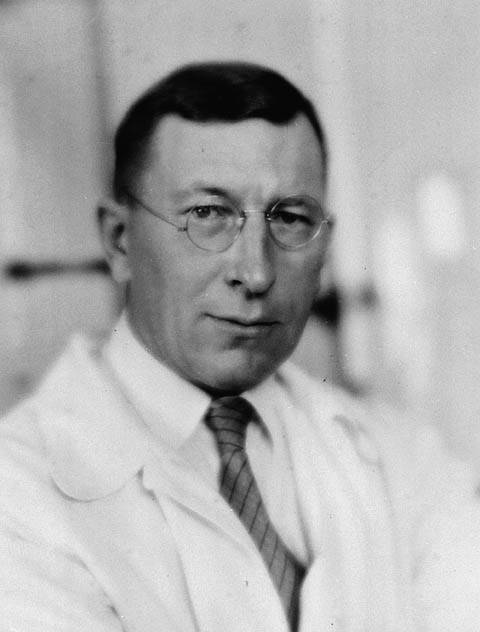
FAQ About Frederick Banting

Who was Frederick Banting?
Frederick Banting was a Canadian physician and medical scientist best known for his role in the discovery of insulin. Born on November 14, 1891, in Alliston, Ontario, Banting's groundbreaking work in the early 1920s on the hormone insulin significantly advanced the treatment of diabetes. Before his work on insulin, diabetes was often a fatal disease due to the body's inability to regulate blood sugar levels.

What led Frederick Banting to research insulin?
Banting was inspired to research insulin after reading an article about the pancreatic duct's role in producing digestive enzymes. He hypothesized that if the pancreas was degenerated, it would destroy the insulin-producing islets of Langerhans. This theory led Banting to devise experiments to isolate insulin in collaboration with Charles Best and under the supervision of Professor J.J.R. Macleod at the University of Toronto.

How did Frederick Banting discover insulin?
Banting discovered insulin by conducting experiments on dogs, where he ligated the pancreatic ducts to stop the flow of digestive enzymes, allowing the pancreatic islets to be extracted without significant degradation. In partnership with Charles Best, Banting successfully isolated the hormone insulin, leading to its development as a treatment for diabetes.

What was Frederick Banting's contribution to medicine?
Frederick Banting's most notable contribution to medicine was the discovery of insulin in 1921, which transformed the treatment of diabetes. His work allowed people with diabetes to manage their condition effectively, preventing what was once an often-deadly disease from leading to a premature death. The discovery of insulin earned Banting the Nobel Prize in Physiology or Medicine in 1923, making him one of the youngest Nobel laureates in history.

Did Frederick Banting receive recognition for his work on insulin?
Yes, Frederick Banting received significant recognition for his work on insulin. In 1923, he was awarded the Nobel Prize in Physiology or Medicine, which he shared with John Macleod, under whose supervision Banting conducted his experiments. Banting shared his prize money with his assistant Charles Best, recognizing Best's crucial role in the discovery.

How did Frederick Banting's discovery of insulin change diabetes treatment?
The discovery of insulin changed diabetes treatment from a generally lethal condition to a manageable illness. Before insulin, individuals with Type 1 diabetes, in particular, had an extremely limited lifespan, as they could not regulate their blood sugar levels. With insulin, patients could control their blood glucose levels effectively, allowing them to lead longer, healthier lives.

What was Frederick Banting's educational background?
Frederick Banting studied at the University of Toronto, where he initially pursued a general arts degree but then switched to medicine. He obtained his M.D. degree in 1916. Banting served as a medical officer in the Canadian Army during World War I before returning to Toronto to further his studies, which eventually led him to research and co-discover insulin.

What other accomplishments did Frederick Banting achieve in his career?
Besides discovering insulin, Frederick Banting made several other significant contributions to medical research. He studied silicosis and cancer, and during World War II, he researched aviation medicine, focusing on issues affecting pilots. Banting was also an accomplished painter and a Fellow of the Royal Society of Canada.

What impact did Frederick Banting's work have on the world?
Frederick Banting's discovery of insulin had a profound global impact, saving millions of lives worldwide. It opened up new research avenues in endocrinology and diabetes management, significantly improving the quality of life for diabetic patients. His work laid the foundation for modern diabetes treatment and research.

What were some challenges Frederick Banting faced during his insulin research?
One of the major challenges Banting faced was the difficulty of isolating insulin in a pure form sufficient to treat people. Initial preparations were impure, causing harmful side effects. However, collaborative efforts with biochemist James Collip eventually led to a refined and safe form of insulin that could be used clinically.

Why did Frederick Banting win the Nobel Prize in Physiology or Medicine?
Frederick Banting won the Nobel Prize in Physiology or Medicine in 1923 due to his groundbreaking discovery of insulin, which dramatically altered the treatment paradigm for diabetes, converting a fatal disease into a manageable chronic condition. Despite some controversies over the distribution of the prize, his contributions were universally recognized.

What is Frederick Banting's legacy today?
Frederick Banting's legacy endures in the ongoing use and development of insulin for diabetes management. His pioneering work paved the way for advances in endocrinology and biotechnology, impacting millions of lives. Banting's commitment to medical research and innovation is celebrated annually on World Diabetes Day, observed on his birthday, November 14th.

How did Frederick Banting's work influence later diabetes research?
Banting's discovery of insulin set the stage for more sophisticated research into diabetes and other endocrine disorders. His work inspired a generation of scientists and led to the development of various types of insulin, delivery methods, and treatments that continue to evolve, improving patient outcomes worldwide.

What was Frederick Banting's role in World War I?
During World War I, Frederick Banting served as a medical officer in the Canadian Army. He was stationed in France, where he gained significant medical experience that later influenced his clinical and research approaches. His military service underscored his dedication to medicine and his country's needs.

Did Frederick Banting have any hobbies or interests outside of medicine?
Yes, besides his medical career, Frederick Banting was a passionate artist. He enjoyed painting and was friends with prominent Canadian artists like A.Y. Jackson of the Group of Seven. Banting's work and travels influenced his art, which provided a creative outlet alongside his scientific endeavors.

What were Frederick Banting's later life and career like?
Following his discovery of insulin, Banting continued to pursue research in medical science. He focused on topics like aviation medicine during World War II, which included studying the effects of flight on pilots. Tragically, Banting's life was cut short when he died in a plane crash in 1941, yet his contributions have left a lasting legacy.

Why is November 14 celebrated as World Diabetes Day?
November 14 is celebrated as World Diabetes Day in recognition of Frederick Banting's birthday. The day honors his invaluable contribution to diabetics worldwide through the discovery of insulin. Established by the International Diabetes Federation, it aims to raise awareness and support diabetes management and research.

What did Frederick Banting achieve after winning the Nobel Prize?
After winning the Nobel Prize, Banting continued to contribute to medical research. He held the Banting and Best Chair of Medical Research at the University of Toronto and was actively involved in studies on cancer, silicosis, and other diseases. He also worked on aviation medicine during WWII, where his work had significant implications for aircrew safety.

Where can one learn more about Frederick Banting's work and legacy?
To learn more about Frederick Banting's work and legacy, one can visit the Banting House National Historic Site in London, Ontario, which preserves his memory and achievements. Various biographies and documentaries are available, and academic articles about his contributions can be found in medical history publications.

How does Frederick Banting continue to influence medical research today?
Banting's discovery of insulin continues to be a cornerstone in diabetes treatment, influencing ongoing research into better treatments and potential cures. His methodology in persistent experimentation and collaboration sets a benchmark for medical research and underscores the importance of innovation and dedication in scientific endeavors.
